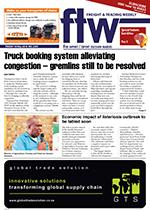The South African Revenue Service (Sars) will introduce penalties for non-compliance with the Customs Reporting of Conveyances and Goods (RCG) project – one of three main pillars of Sars’ New Customs Acts Programme (NCAP) – from 1 August 2018, according to Beyers Theron, Sars executive: Customs and Excise Centre of Excellence.
“It has been mandatory to submit electronic cargo reports to Sars since 2009. However, this has not been strictly enforced in order to give industry the opportunity to develop the necessary capability to report electronically,” he said.
While it seemed to be a seamless switch for land border operators late last month – with Sars customers reportedly welcoming the new benefits – Theron said that the system could take more time to get used to for many sea and air modality clients who have never submitted electronic reports before.
“Global Trade Solution (GTS) customers – like Shoprite, Woolworths and Edcon – were among the first traders to cross the border posts at Skilpadshek, Kopfontein, Maseru Bridge and Lebombo on the new RCG system,” said GTS executive, Magda Hugo.
“We provide end-to-end enablement through our integrated solution and our web portal to enable our customers to implement the new system which replaces the Manifest Processing (MPR) process.” She told FTW that GTS had worked closely with Sars to ensure a seamless switchover.
“The adoption among many big retail and other clients has been excellent as they believe it to be in their best interests to lead the way with new Sars initiatives due to the benefits that they are experiencing,” said Hugo. These benefits included additional supply chain security and risk management.
“The paperless cargo reporting system will bring an end to one of the last remaining paperbased processes in Sars and will provide Customs officials with the capability of tracking goods from beginning to end,” said chief officer of customs and excise, Teboho Mokoena.

